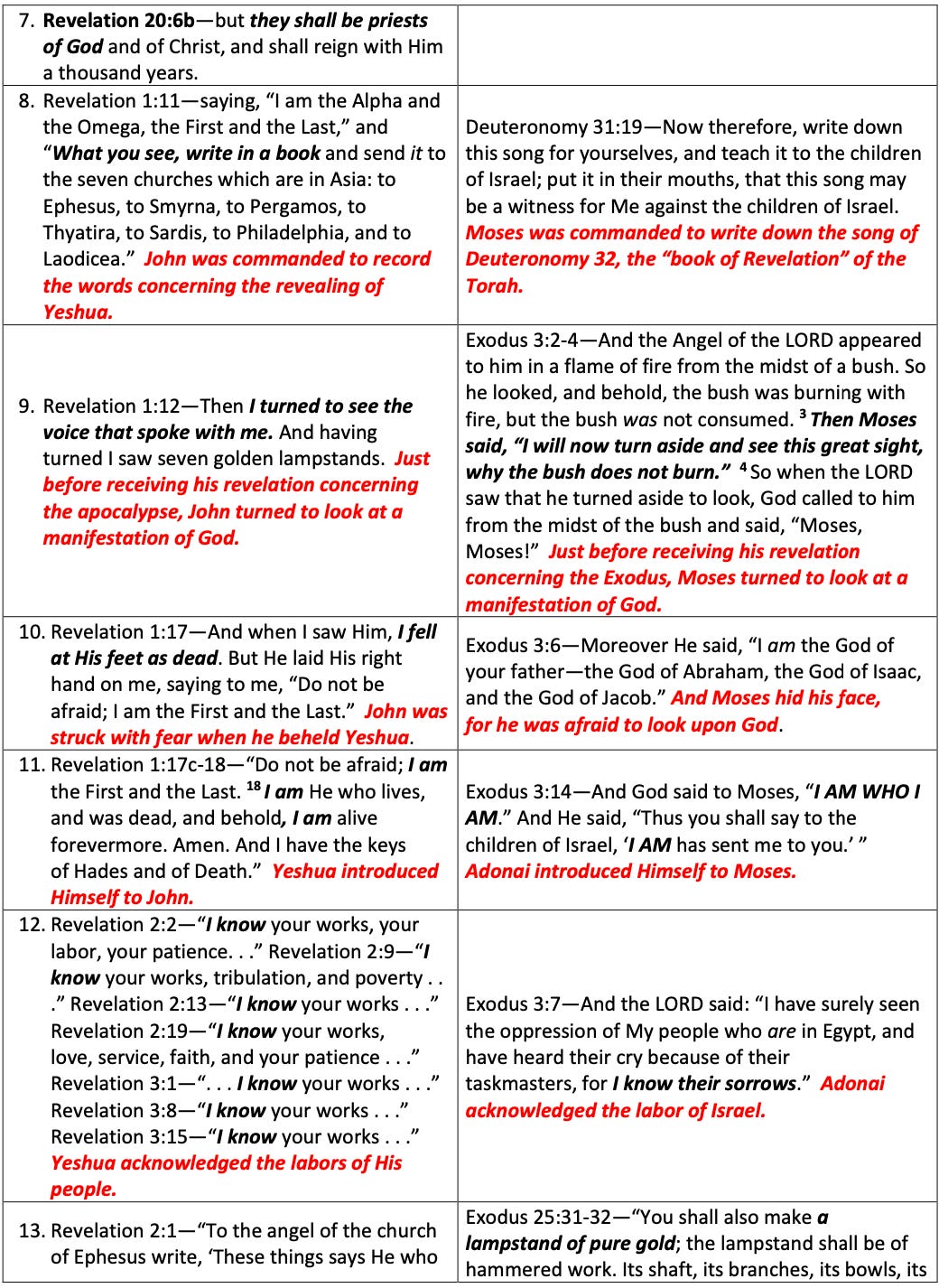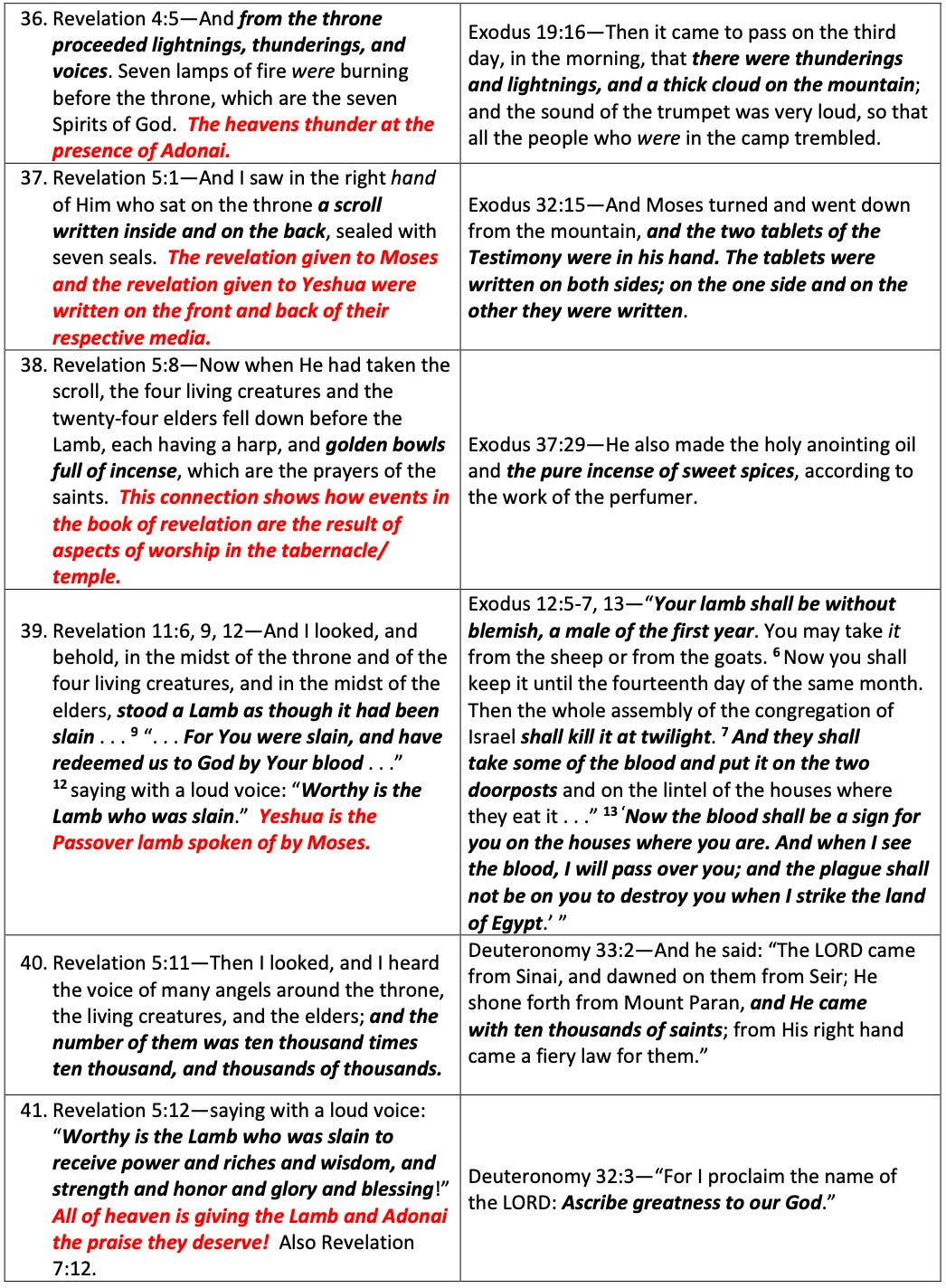The Importance of the Story of the Exodus
As you may recall from my article, Who Are the Prophetic Forerunners of the Man-Child/144,000 of the Book of Revelation? Part 4, the story of the Exodus is intimately connected to the book of Revelation. This should not surprise you, but if it does, please remember that the Torah is a prophetic book! It’s not just history. It’s also prophecy. This point was made clear by Paul when he reminded the Corinthian congregation of its prophetic nature.
Moreover, brethren, I do not want you to be unaware that all our fathers were under the cloud, all passed through the sea, 2 all were baptized into Moses in the cloud and in the sea, 3 all ate the same spiritual food, 4 and all drank the same spiritual drink. For they drank of that spiritual Rock that followed them, and that Rock was Christ. 5 But with most of them God was not well pleased, for their bodies were scattered in the wilderness. 6 Now these things became our examples, to the intent that we should not lust after evil things as they also lusted. 7 And do not become idolaters as were some of them. As it is written, “The people sat down to eat and drink, and rose up to play.” 8 Nor let us commit sexual immorality, as some of them did, and in one day twenty-three thousand fell; 9 nor let us tempt Christ, as some of them also tempted, and were destroyed by serpents; 10 nor complain, as some of them also complained, and were destroyed by the destroyer. 11 Now all these things happened to them as examples, and they were written for our admonition, upon whom the ends of the ages have come (1 Corinthians 10:1-11).
The most important portion of this passage is verse eleven, where it states that the events Paul mentioned were written as examples for those “upon whom the ends of the ages have come.” 1 Corinthians 10:1-11 mentions a number of events from Israel’s past history including the splitting of the Red Sea, the incident of the golden calf, the incident of Baal Peor, and the complaints about those who died during Korah’s rebellion. If you think about these events and the time frame of their occurrence, you’ll soon realize they were all events that occurred during Israel’s exodus from Egypt and travels towards the Promised Land. With this in mind, let’s think about Paul’s statement about the importance of these events. In a nutshell, he stated that the events of the Exodus and wilderness wanderings were written as examples for those “upon whom the ends of the ages have come.” And who are those upon whom the ends of the ages have come? He is specifically speaking of those who will be here on planet earth during the time of events in the book of Revelation when Yeshua returns! I like to put it this way. Please let that sink in. It’s so easy for us to read the Scriptures and yet not realize the profundity of some of its claims! Basically, Paul has just stated that the events pertaining to Israel’s exodus and wilderness wanderings were written with a particular generation in mind—the last generation who will be alive to experience the second coming of Messiah Yeshua! In other words, the last generation, those upon whom the ends of the ages have come, will need guidance, wisdom, examples and instruction in order to remain faithful and prevail; and that guidance, wisdom, and instruction is to be found specifically in the stories concerning Israel’s exodus from Egypt and travels to the Promised Land. Thus, the story of the Exodus contains the Who, What, When, Where, Why and How of the apocalypse!
The Importance of the Pattern of Judgments
As you will recall from my series of articles entitled the Pattern of Judgments, Genesis 1-3 contains a series of themes that prophetically repeat in cycles throughout the Bible, from Genesis to Revelation. We discovered that the two most powerful themes pertained to New Creation and Judgment/Exile. These two themes mark the beginning and end of each cycle in the Pattern of Judgments. For example, Adam and Eve were the beneficiaries of the new creation of the heavens and earth and Adam was given authority to rule and reign on Adonai’s behalf. Eventually Adam fell into sin and experienced Adonai’s judgment by being exiled from the Garden of Eden. This set a pattern for many other stories in the Bible, where 1) Adonai initiated some form of new creation, 2) someone was given Adonai’s authority to rule and reign in some capacity, 3) that person fell into some type of sin, and 4) Adonai executed some type of divine judgment. More importantly, we noted each instance of new creation and judgment/exile and discovered that the stories of judgment were all precursors or prophetic foreshadows of the final judgment found in the book of Revelation. Thus, Noah’s flood, the destruction of Sodom and Gomorrah, Egypt, Jericho, the seven nations of Canaan, as well as many other events, are prophetic sneak peaks that help define the future judgments found in the book of Revelation. As you can see, the lessons we learned in the Pattern of Judgments is very similar to what we’ve discovered in 1 Corinthians 10:1-11! Many of the events in the Tanakh were written to teach us specifically about the events in the book of Revelation! Therefore, in order to understand the book of Revelation, it’s imperative that we know which stories in the Tanakh are prophetic pictures of the book of Revelation. This is especially true because the days preceding Yeshua’s return have been characterized as days of deception. Yeshua warned us concerning the deception of the last days:
And unless those days were shortened, no flesh would be saved; but for the elect’s sake those days will be shortened. 23 “Then if anyone says to you, ‘Look, here is the Christ!’ or ‘There!’ do not believe it. 24 For false christs and false prophets will rise and show great signs and wonders to deceive, if possible, even the elect. 25 See, I have told you beforehand (Matthew 24:22-25).
The coming of the lawless one is according to the working of Satan, with all power, signs, and lying wonders, 10 and with all unrighteous deception among those who perish, because they did not receive the love of the truth, that they might be saved. 11 And for this reason God will send them strong delusion, that they should believe the lie, 12 that they all may be condemned who did not believe the truth but had pleasure in unrighteousness (2 Thessalonians 2:9-12).
The bottom line? In order to understand the book of Revelation you need to understand the Exodus. In fact, the story of the Exodus IS the story of the book of Revelation, even though, on the surface, it may not appear to be so. I’ll demonstrate this to you by examining many of the the thematic connections and prophetic parallels between the Exodus and the book of Revelation. By examining these parallels, you will see with your own eyes that Adonai has “labored” to connect these two periods of time in order that we learn lessons from the past to ensure our success in the future. In the next few articles, I will share many, many connections between these two stories, providing numerous, well-documented connections between the Exodus and the book of Revelation for your own study and hopefully to share with others.
As you peruse the connections below (and in subsequent articles), you will notice a significant number of connections between the book of Revelation and the song Moses taught the children of Israel in Deuteronomy 32 (from the Torah portion known as Ha’azinu). I refer to Moses’ song in Deuteronomy 32 as “the book of Revelation” of the Torah.
If at some point you’d like to make an in-depth study of Deuteronomy 32, then you can study my yearly Torah portion entitled Ha’azinu. For now, please note the following connections between the book of Revelation (chapters 1-8) and the Exodus.














